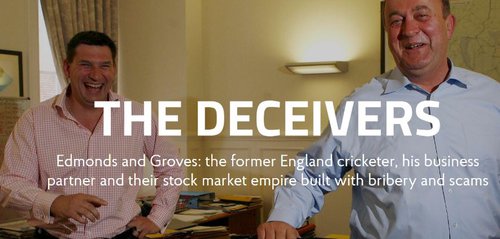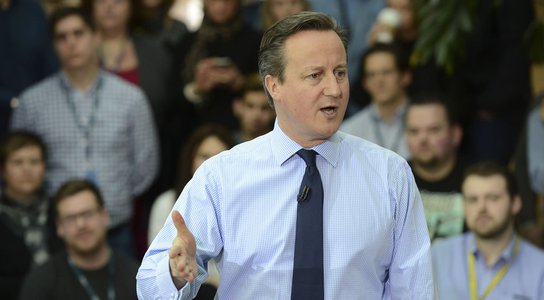Updated 31 July 2019 - see below
Ashes winner Phil Edmonds and his business partner relied on offshore secrecy to rip off British investors and pocket millions
Ashes-winning spin bowler Phil Edmonds and his partner Andrew Groves built a corrupt business empire in Africa on bribes, scams and intimidation. They floated companies on London’s junior stock exchange that ripped off UK and other investors by millions of pounds, a year-long investigation from Global Witness reveals today.
The report, The Deceivers, reveals how they used offshore companies to sell assets to companies they listed on the Alternative Investment Market (AIM) in London, without telling the market that they were on both sides of the deal. These scams allowed the pair to repeatedly defraud ordinary UK pension holders and other investors of millions of pounds.
 As David Cameron prepares to host a global
anti-corruption summit in London, the revelations will increase pressure for
him to tackle this kind of corruption by requiring UK tax havens to create public registers of the real
owners of companies, as the UK will shortly do. The findings also raise major
concerns over lax stock market regulation. AIM is controlled by the main London Stock Exchange. Its listed companies are worth £71 billion, and while the majority of
its investors are individuals, over 40% are institutions representing pension
funds and savers’ ISA accounts.
As David Cameron prepares to host a global
anti-corruption summit in London, the revelations will increase pressure for
him to tackle this kind of corruption by requiring UK tax havens to create public registers of the real
owners of companies, as the UK will shortly do. The findings also raise major
concerns over lax stock market regulation. AIM is controlled by the main London Stock Exchange. Its listed companies are worth £71 billion, and while the majority of
its investors are individuals, over 40% are institutions representing pension
funds and savers’ ISA accounts.
“Phil Edmonds had two careers: first as a
sportsman, the second as a mining baron. Both were built on spin,” said Daniel
Balint-Kurti of Global Witness. “This incredible story of bribery, fraud and
intimidation shows how pervasive the threats hidden in our tax havens are.
Using secret companies in the British Virgin
Islands and other tax havens, Edmonds and his partner Andrew Groves were able
to repeatedly cheat investors,
without serious challenges from financial regulators.”
“David Cameron should protect British savers and pension holders from scams like this. The world will be watching to see his plans for the tax havens to open their books at Thursday’s corruption summit.”
In one scam, an offshore firm Edmonds and Groves secretly controlled purchased land for $2.2 million and sold it on for $5.5 million of cash and shares to their London-listed company, siphoning off millions of investors’ money. Edmonds and Groves say the deal was legitimate and not all the profit was realized. They say the money went to family trusts in which they had no interest, highlighting a further financial loophole which lets them do deals with such trusts.
The key findings from the investigation are:
- Edmonds and Groves'
mining company Sable paid out bribes to some of Liberia’s
most senior officials to change the country’s
procurement law as they attempted to win a huge mining
concession. In Guinea, they targeted the inner circle of Alpha Condé
during the election campaign that brought him to power.
Hiring an intermediary whose tactics including bribing officials, they won a
lucrative iron ore concession that threatens a Unesco World Heritage Site, in
breach of the law. In South Africa and elsewhere, their
agents spied, hacked and intimidated rivals—leaving
some fearing for their lives.
- Hiding behind
anonymously-owned shell companies in secrecy jurisdictions like the UK’s
British Virgin Islands, they sold assets they secretly controlled
to their AIM-listed companies and creamed off
millions.
- Edmonds and Groves’
scams are far from unique; plenty of others have used this
kind of secrecy to con investors on London’s
junior stock
exchange, the Alternative Investment Market. For example, in October 2015
shares in one of its most traded companies, software developer Globo, plummeted
after it emerged the company had set up dozens of fake clients and suppliers in
offshore jurisdictions including Panama and Cyprus (3).
- This poses a huge, hidden risk to
investors on UK stock markets, including
AIM. The junior stock market
is home to over 1,000 companies worth a combined £71 billion, and has
been labelled a “casino” by a senior US
regulator due to its lax regulation (2). 59 per cent of its investors are
individuals, while the remainder are institutions representing pension funds
and savers’ ISA accounts. The
Financial Times found in 2015 that shareholders would have lost money on 72 per
cent of companies ever listed on AIM.
David Cameron will host a historic anti-corruption summit on 12 May. In the wake of the Panama Papers, attention has focused on the role of the UK’s tax havens in facilitating financial crime and corruption. The UK’s tax havens are home to more than half the secret companies named in leaked files from Panama law firm Mossack Fonseca, and are under increasing pressure to step out of the shadows. From June, people who want to set up a company in mainland UK will be required to declare who the real, “beneficial” owner is on a fully public register. So far, the tax havens have refused to implement such measures.
If the tax havens will not open up voluntarily, the government should make them. David Cameron has himself stated that the UK’s overseas territories should do more to become transparent, while anti-corruption champion Sir Eric Pickles has said that the government could legislate to make this happen. The UK has used its powers over the tax havens, or “Overseas Territories” a number of times in the past, – for example by requiring the Caribbean Territories to abolish the death penalty and decriminalise homosexuality (see here for more).
“In the past few weeks, we’ve seen just how much crime and corruption is enabled offshore, making life easy for dictators, money launderers and tax evaders. This shows the damage that does on our shores. It makes no sense that we are letting our tax havens sell secrecy that allows listed companies to scam savers and investors at home, especially when the government is pushing for the whole world to become more transparent. This is a leadership test for the Prime Minister—we’re not going to solve this until we clean up our own backyard to protect our own citizens,” said Balint-Kurti.
Given the problems uncovered in the report, Global Witness is making the following recommendations:
- The UK’s tax havens should
be required to declare who the real owners of companies registered there are.
The UK government has committed to such measures in mainland UK, and has the
power to force the Overseas Territories to do so. It must use it, so that fraudsters
and criminals cannot use these companies to cover their tracks and rip off
innocent investors or developing economies.
- The AIM stock market
should be far better regulated. As a start, it should
insist on listed companies declaring their beneficial owners and revealing far
greater details of their major transactions.
- The Serious Fraud
Office (SFO) should investigate the evidence of criminal wrongdoing in this
report, and prosecute where necessary.
“Mr Edmonds and Mr Groves deny any allegations of wrongdoing,” they said in a joint response to questions, telling Global Witness that they are “committed to ensuring that all their business is conducted in a responsible and ethical manner”. “They “are very proud of what they have achieved in business in Africa” and “feel very privileged to have been involved in so many ventures which were designed to develop business and industry across the continent”, according to the letter.
Edmonds and Groves said the land deal wasn’t against the rules because the cash and shares went to family trusts for the benefit of their non-immediate relatives. They also said these trusts didn’t profit because the shares decreased in value. It wouldn’t be appropriate to give weight to testimony from “disaffected parties, including any allegations of intimidation, as they clearly have questionable motives”, they added.
Sable said it had conducted a review into the Liberian payments in 2011. No evidence implicating the board was found, it said, and financial controls were tightened as a result. Sable said that in Guinea it paid for consultancy services from a lobbyist who was not a public official and which was fully disclosed. The payments were “fully justifiable”, it said.
Update: On 30 July 2019, following a trial at criminal court C in Monrovia, Liberia, Judge Peter Gbeneweleh, acting as judge and jury, acquitted those on the indictment of all charges, it was reported. The defendants faced counts of economic sabotage, bribery, criminal facilitation, conspiracy and solicitation and had denied the charges.
/ ENDS
You might also like
-
Briefing Spin and Secrecy in the Carribean

-
UK Anti-Corruption Summit
After the Panama papers, the UK must tackle corruption in its own backyard at the Anti-Corruption Summit in London -
Press release David Cameron: Majority of British public want you to act on the tax havens
Our joint ComRes poll with Christian Aid shows overwhelming majority want action